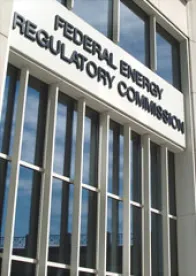On Sept. 29, 2017, the U.S. Department of Energy (DOE) issued a Notice of Proposed Rulemaking (NOPR) asking the Federal Energy Regulatory Commission (FERC) to expeditiously enact rules promoting electric grid reliability by compensating generators that have on-site fuel supplies, such as coal-fired and nuclear power plants, and operate in wholesale markets. According to the NOPR, “[i]Immediate action is necessary to ensure fair compensation in order to stop the imminent loss of generators with on-site fuel supplies, and thereby preserve the benefits of generation diversity and avoid the severe consequences that additional shut-downs would have on the electric grid.” Comments on the proposed rule are due in FERC Docket No. RM18-1-000 by Oct. 23. Replies are due by Nov. 7.
Eligible Grid Reliability and Resiliency Resources
The NOPR directs FERC to require the independent system operators and regional transmission organizations (ISOs/RTOs) with day-ahead and real-time markets (or their equivalent) to revise their tariffs to compensate so called “eligible grid reliability and resiliency resources” when the resource:
is an electric generation resource physically located within a FERC-approved independent system operator or regional transmission organization;
is able to provide essential energy and ancillary reliability services, including but not limited to voltage support, frequency services, operating reserves, and reactive power;
has a 90-day fuel supply on site enabling it to operate during an emergency, extreme weather conditions, or a natural or man-made disaster;
is compliant with all applicable federal, state, and local environmental laws, rules, and regulations; and
is not subject to cost of service rate regulation by any state or local regulatory authority.
Compensation Rate
The ISO/RTO would be required to revise their tariffs to provide just and reasonable compensation to the resource for the recovery of costs for being dispatched including the benefits and services provided to grid operations, including reliability and resiliency. Compensable costs would include, but not be limited to, operating and fuel expenses, costs of capital and debt, and a fair return on equity.
DOE Identifies Reliability Concerns
According to the DOE, reliability and resiliency of the electric grid is threatened by the premature retirements of power plants that can withstand major fuel supply disruptions caused by natural or man-made disasters. Between 2015 and 2020, 34.4 GW of summer capacity is planned to be retired; of these units, 79 percent are coal/natural gas facilities and 15 percent are nuclear plants. Also, the loss of generation capacity could have been catastrophic but for the retention of coal-fired plants that were scheduled for retirements and nuclear facilities coming online during the 2014 Polar Vortex, argues the DOE. In addition, the DOE cites concerns by the North American Electric Reliability Corporation, Congress, and FERC regarding deficiencies in the way the regulated wholesale markets price power. The DOE then alleges that FERC and the ISOs/RTOs have failed to maintain a resilient electric grid.
Timing and Associations’ Request
FERC is requested to take final action on the DOE’s proposal within 60 days of publication of the notice of the NOPR in the Federal Register. Alternatively, the DOE asks FERC to issue the proposed rules as an interim final rule, effective immediately, with provision for later modifications after consideration of public comments. Any final rule adopting the proposal would take effect within 30 days of publication in the Federal Register.
As an independent federal agency, FERC can reject, modify, or accept the DOE’s proposal. The DOE’s proposal is just that – a proposal. Given the aggressiveness of the timing and the magnitude of the possible changes to the functioning of wholesale markets, it seems likely that affected generation resources will seek to extend these timelines.
A motion was recently filed by several energy industry associations requesting that FERC reject the DOE’s proposed timelines and initiate a technical conference allowing for at least a 90-day comment period for initial feedback.
What This Could Mean for Wholesale Markets
As proposed, the DOE’s proposal could bring sweeping changes to the wholesale markets. Wholesale electric markets are designed to procure lowest-cost, presumably efficient resources to supply electricity reliability and cost effectively in a way that promotes generation investments and resource adequacy. As such, it is not clear how a guaranteed payment to slow retirements of fuel-dependent resources, (i.e., primarily to coal-fired and nuclear generating facilities) to make the electric grid more reliable might distort the markets that FERC created – and what any such distortion could mean for innovation, pricing and other components of reliability and resiliency.
Equally unclear is whether there should be exceptions made to the proposed definition of an eligible grid reliability and resiliency resource, which is defined by the DOE to exclude cost of service rate regulated resources. Should cost of service generation resources receive additional compensation for being dispatched where the ISOs/RTOs already require such offers? How would the proposed cost recovery fit into the wholesale market auctions and market clearing price mechanisms? What is clear is that implementation of the DOE’s proposals will require a hard look and more time has been requested to allow the industry to fully evaluate them.
Lauren Box also contributed to this article.









 />i
/>i

